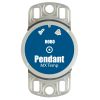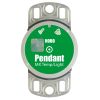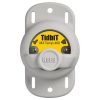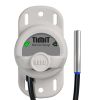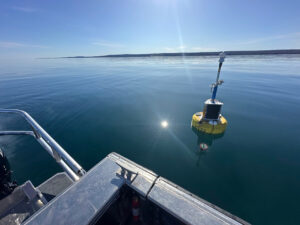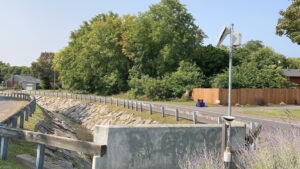Onset HOBO TidbiT MX Temp 5000 Logger
Features
- Waterproof to 1500 meters (5000 feet)
- Water detection feature records when logger is in and out of the water
- Convenient wireless setup and download via Bluetooth Low Energy (BLE)
- Expedited repair and warranty service
- Lifetime technical support
- More
Overview
The HOBO MX2204 TidbiT waterproof temperature logger leverages the power of Bluetooth Low Energy (BLE) to deliver high-accuracy temperature measurements straight to a mobile device or Windows computer with Onset's free HOBOconnect app. Designed for durability, the MX2204 rugged, waterproof logger is ideal for long-term deployments in streams, lakes, and oceans. The HOBO TidbiT also provides the additional feature to detect and record the presence of water which is ideal for monitoring intermittent water applications.
Benefits
- Convenient wireless setup and download via Bluetooth Low Energy (BLE)
- Large memory stores 96,000 measurements
- Waterproof to 1500 meters (5000 feet)
- Water detection feature records when logger is in and out of the water
- Waterproof boot protects the logger during deployment
- LED alarm notifies you when temperatures exceed a set threshold
- Battery life extension feature
- Works with Onset’s free HOBOconnect app
- ±0.2°C (±0.36°F) accuracy
- Data Logger
- Protective Boot
In The News
Sargassum Surge: How Seaweed is Transforming our Oceans and Coastal Ecosystems
Until recently, Sargassum –a free-floating seaweed–was distributed throughout the Sargasso Sea , the north Caribbean Sea, and the Gulf of Mexico. But in the space of a decade, this seaweed has, as one scientist remarks , “Gone from a nonfactor to the source of a terrible crisis.” Driven by climate change, anomalous North Atlantic Oscillation in 2009-2010 and a glut of anthropogenic pollutants, sargassum has proliferated. Seasonally recurrent mats as deep as 7m now bloom in the “Great Atlantic Sargassum Belt” (GASB), which covers areas of the Atlantic from West Africa to the Caribbean Sea and Gulf of Mexico. Every year, millions of tons wash up along the shores of more than 30 countries . Dr.
Read MoreGreat Lakes Research Center: Designing Targeted Monitoring Solutions
According to the National Oceanic and Atmospheric Administration ( NOAA ), the Great Lakes have more miles of coastline than the contiguous Atlantic and Pacific coasts combined and contain 20 percent of the world's freshwater, making it a critical region to protect and conserve. Continuous monitoring and data-informed resource management are key components of managing waters in the region. Hayden Henderson, a research engineer with the Great Lakes Research Center (GLRC), designs and deploys monitoring platforms throughout the Great Lakes. With a background in environmental engineering, Henderson enjoyed the challenge of creating systems and making them work to obtain difficult, remote measurements.
Read MoreMonitoring Meadowbrook Creek: Real-Time Data Collection in an Urban Creek
Meadowbrook Creek in Syracuse, New York, has been monitored by Syracuse University (SU) faculty and students for over a decade. Originally established by Dr. Laura Lautz in 2012, the early years of the program focused on collecting grab water samples for laboratory analysis and evaluating the impact of urban land use, human activities, and natural processes on water resources. Tao Wen , an Assistant Professor in SU’s Department of Earth and Environmental Sciences, took over the program in 2020 and upgraded the existing systems to include 4G modems that allowed for real-time data viewing. [caption id="attachment_39339" align="alignnone" width="940"] An overview of the Fellows Ave monitoring station along Meadowbrook Creek.
Read More






